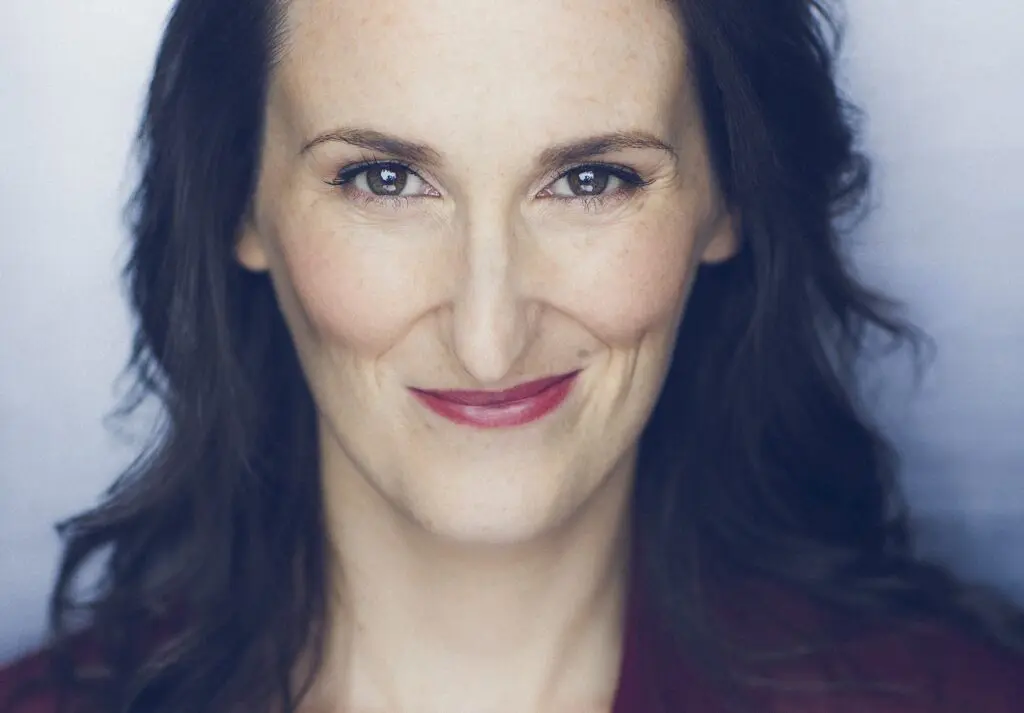Jeff and Crystal Moore – New Book for Singers
By Staff on March 19, 2024
Jeff and Crystal Moore – New Book for Singers – by Liam Sweeny.
We encountered our friends and small business owners Jeff and Crystal Moore from Peak Music Studios, who have a book coming out, Your Singing Questions Answered: A Handbook for Beginning Singers.
RRX: So let me go ahead and ask you the first question I got. I am going to come right out and say it. What is the number one question people ask you about singing? And, and then after that, what’s the number two question?
JM: Well, the number one question is usually, do I have talent? And that’s a very interesting question. And the number two question is, can I extend my range? And both of those questions were what led us to write the book. Which is, there’s so much misunderstood by asking those questions. Do I have talent when it’s like, can I learn to walk? And it’s like ‘do I have the talent to walk?’ Yes, you do. We just need to show you how to do that. It seemed like a natural follow up from there.
RRX: Speaking of talent, since we’re, we’re talking about that, do you think people overestimate their their potential for talent or do you think people underestimate that?
JM: It’s about 98%, 99% way underestimate talent By talent, a metrics that allow you to sing, which is rhythm, timing, pitch. A lot of memory, people think that they are, and they use the word terrible. I rate it on a scale. So it’s, it’s easier to talk about. But it is, most people are just very concerned that their singing is not good enough. And that’s one of the nice things about being able to give people a path forward that want to present their voice is it’s really, not that difficult. There’s just so much misinformation and so much emotion tied up in the voice that makes it uh difficult for people to get out and sing. Now, I’m discounting the drunk karaoke, karaoke people out there. That, that’s, that’s a little bit different. I’m gonna take eight shots of tequila and then I’m gonna sing a song that’s different. Than I wanna improve my voice and sing in front of a group of people.
RRX: Ok. All right. Yeah, that makes sense. And so you’re saying a vast majority of people have an under reading of their their own potential for talent? If I could follow up on that, so as far as the talent, as far as that goes, do you think that starts with an affinity? Like whether you, so however you do this does, does it start with an affinity for actually singing with your voice or is the talent something more inside? Like more of a conceptual part of a person?
JM: Well, that, that’s an interesting and uh insightful question because that’s what it is. If someone, really, says to themselves, I want to sing and present my voice and find a path to do that, we can deal with just about anyone. I have, you know, two students who have Down Syndrome, I have one student that has a serious speech impediment and all of them are moving forward towards performance at different levels. But it is the decision that they want to do that. And, that’s what we found the differentiating factor. If someone is so afraid that they can’t make a decision and say I want to sing, then there’s very little information that I can get them to do that. So it really is an internal thing. And once you get that fire going, I want to perform. I want to sing. There’s, you know, you really can’t stop them once you get that fire going in a person. Right.
RRX: Now you had mentioned having some students with Down Syndrome. Now I had read at the beginning of, um, what, what I Crystal had sent me that you started this journey of your own with the singing with sound from having a speech impairment. Let me give you a second to talk about that because that’s pretty important for someone to understand that about you as they’re reading through the book, I think.
JM: Yes. And that was, uh, I was diagnosed with that, um, um, early on in elementary school. Uh, they picked that up. I had difficulty speaking and making certain sounds. And, um, one thing I noticed as a kid was, I didn’t have a problem when I was singing, and I was enormously embarrassed that I had this speech impediment. So it made me, it drove me to find out, you know, number one to sing. So that when I was singing, I didn’t have the same issues as when I was speaking and to understand as much about my voice as I could and to avoid feeling that way because I felt like an, an outsider I felt like I was an insider when I was singing and when I was just speaking to someone, I felt like an outsider. So it really drove me to try to understand myself. And later on I never thought I would be dealing with students, but it really helps me have a point of connection because I know what it feels like to be embarrassed. I know what it feels like to not feel like you’re good enough to perform and all of those things. So it’s it uh, I’m really happy that I was able to collaborate with Crystal on this because it feels like we’re offering something to the public that’s really worthwhile. Absolutely. Absolutely.
RRX: Hey Crystal. What’s the most common medical thing or like an injury or anything that you see a lot in young singers,
CM: you know, I in our young singers, we really have not seen um many medical issues that prevent them from singing like Jeff said we might have students who have some speech impairments, for example, but in terms of any sort of medical disorders that, you know, prevent them from, from singing, really haven’t seen that. One of the things that we do is we screen for that. So, you know, we ask if you have any pain while you’re singing or if, while they are singing, you know, they have, um, that, that they’re coughing or they complain of their throat hurting. So, you know, we really encourage people if that happens, which is pretty rare, um, to, you know, certainly get that checked out.
RRX: Yeah, I think I’m asking what would you see in a young singer as a result of them just getting on stage the day before and singing? I think that’s what I mean. What do you see for a lot of young singers as a casualty of war when they get up on the stage for the first or second time?
CM: You know, when they’re on stage for the, the very first time, they often sing really quietly. And so when you sing quietly, your pitch is often off and also, the remembering of lyrics that seems to be something that is, uh, you know, can, can throw them a little bit because of the fact that they often are so very nervous when they get in front of the crowd. So, um those are the primarily two things that we see and they stand there like a board if you know what I mean? So we really work, on performance metrics, you know, we work on dynamics. And everybody has to go through that the first or second time. And if they can make it through that, they are on their way just about every performance. With our youth singers, we do have tiers. So, uh you know, that’s one or two that they feel that they, you know, it messed up and they have very high expectations for themselves and, and we really try to emphasize that mistakes are gonna happen and that you learn from them, but above all, no matter what happens, just keep saying it don’t stop.
RRX: What is your “head voice?” And what is your “chest voice?” And can you, in fact, say it with your chest?
JM: Ok. So the, the chest voice is basically your speaking voice. That is the range that you use on a day to day basis. Speaking, it is the T-A muscle group that is responsible for most of that. The uh CT muscle group, um, is responsible for the head voice and that is the stretching and thinning out of the vocal folds. And that is a higher pitched voice. And between those two things as you’re moving up, you get to where your break is, which is kind of the transition between the two muscle groups. And that’s why you get that weird behavior, voice flips, and those type of things. They call it “head voice” because it kind of feels like it resonates in your head and “chest voice” because it resonates in your chest. But it’s basically just two different muscle groups and whether it’s pushing your vocal folds together and shortening them or stretching them out.
RRX: And I have one more question here I’ll and then I’ll leave the last two for uh Crystal Event. Alright. Ok. Uh I’m gonna do a hard core show tomorrow. I scream. What can I do the day before and the day after to protect my voice?
JM: All right. So the biggest thing that you’re gonna do if you’re doing screaming and heavy grit with your voice is you actually practice a growling technique where your vocal folds are not grinding together. What you want to use is use. They call it your false vocal folds, which is basically the loose tissue around your vocal folds and that will vibrate and that vibration produces the same, effect as if you were grinding your vocal folds and causing all sorts of health issues. So drink a lot of water, learn the right method for screaming and growling and you can carry on a two hour show without any problems.
RRX: Hey, Crystal. OK. So this question is an easy one. Maybe I’ll say. Um Is there one simple thing you wish everybody out there, shower singers to show singer knew? What’s one simple fact?
CM: Think for a second. Well, I think maybe I’ll give you two and then you can, you can pull one is that you have to believe in yourself, is that you, you know, you have to have the confidence, especially if you’re singing in front of other people. But you know, if you’re singing in the shower as well, um keep on singing because singing brings joy and it’s also good for your health. Um So I would, I would say no matter where you’re singing to keep on singing. But one of the things that we have found when we give singing classes is that singing with other people is transformative. When you sing a song with others, you know, there are certain hormones that are released in your body and it can be a way to connect and to transcend above the normal type of relationships that we have with one another. And I know all the musicians out there know that making music with other people is magic.
RRX: Oh, yeah, definitely. OK. So I have one last question. It’s a kind of a fun little question here. Uh Cough drops, yay or nay menthol or honey lemon?
CM: You know, we don’t recommend any one over the other. And, you know, sometimes people think, well, these cough drops or this elixir or whatever is gonna help me sing better. Hydration is the most important thing. You have to really be well hydrated. And so I think one of the things that lozenges do is to help lubricate and to get the saliva flowing. So I think more water but if it feels like the menthol or the honey lemon is gonna help you belt it out better, whatever works for you.
RRX: So tell us a little bit about the book?
CM: Sure. And II I can uh because since I’ve edited about 8 million times. We were inspired to write the book because what we found is that there is so much misinformation on the internet. And so people will often Google a question, they’re overwhelmed with the results and they have a hard time discerning what is fact and what is fiction. And so students would come into our studio with this misinformation. So we wanted to take voice science, which Jeff is well versed in, combine that with the art of singing to provide answers that are, that are based of, on evidence. So the book basically is the most frequently asked questions both in our studio as well as searched on internet engines or search engines about singing.
RRX: What is the title of the book?
CM: The book is “Your Singing Questions Answered: A Handbook for Beginning Singers.
RRX: And when did that come out already or is that coming?
CM: It is gonna be released on April 1st. And no, that’s not an April fools joke. And right now it is in pre order. So folks who pre order the book, there is a free online course that has all of the exercises and bonus material, that we discuss in the book. So we’ll say use a chromatic scale for example, and that’s included in the free course. And in addition, we’re gonna have a webinar on April 2nd at 7 p.m. And for folks who preorder the book that will be exclusive and that’s gonna be a live webinar, and, and the last plug I’ll give is on Friday, March 29th from 5pm to 7pm. We’re gonna have a book launch party at Eden Cafe and there’ll be prizes and a free drink and finger foods,
RRX: Right? Awesome. That sounds good.
CM: And if folks, you know, even if folks would just check us out on Amazon, that would be great. That really helps bump us up in the algorithm, but we also have an author’s website. So it’s just https://www.yoursingingquestionsanswered.com.





 RadioRadioX
RadioRadioX